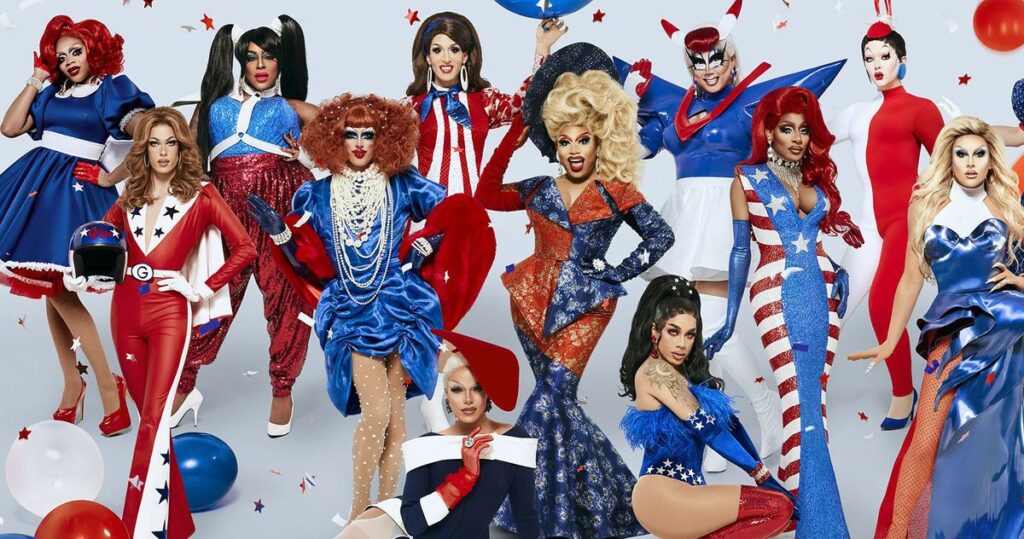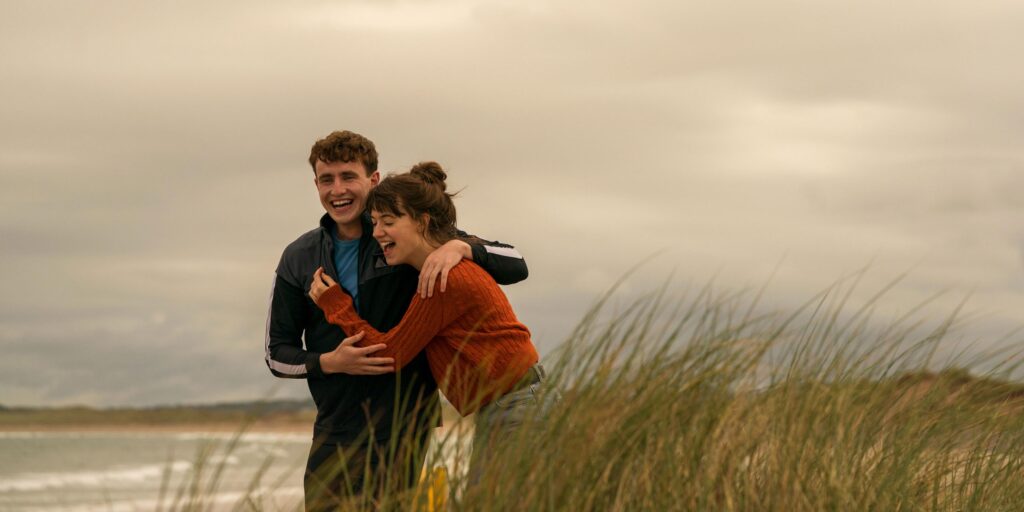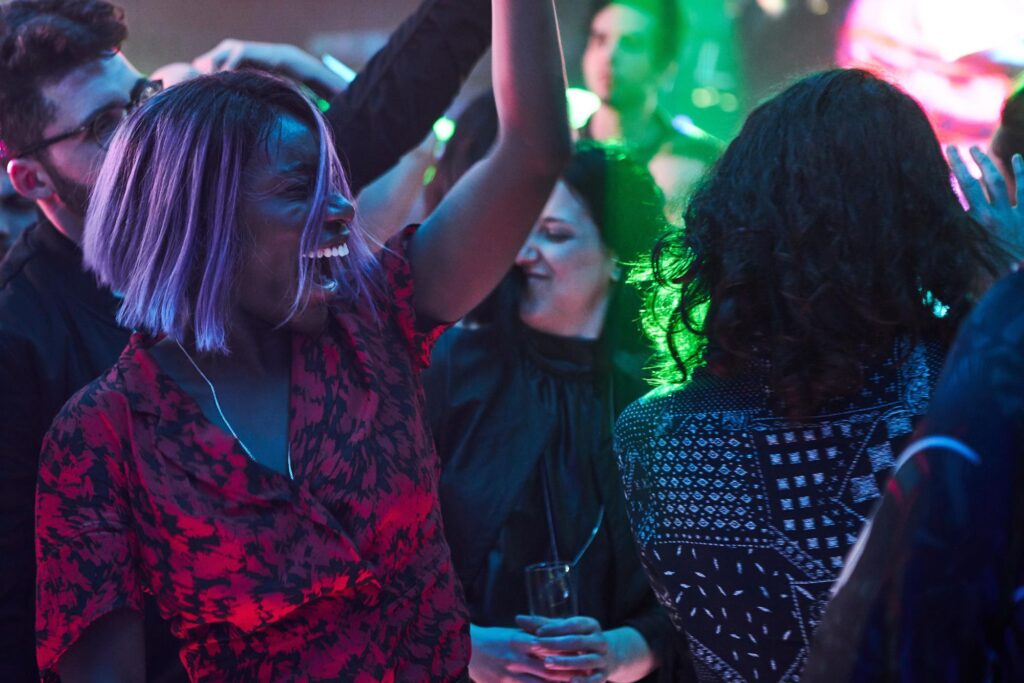RuPaul’s Drag Race–Words by Emily Alexandra Hyatt
There were a lot of shows to watch during lockdown, however, starting a show that I was unfamiliar with was daunting, so I decided to start a show that I was acquainted with. That show was RuPaul’s Drag Race.
Drag Race is a reality TV show where 12 contestants compete to win $100,000 and the title of “America’s Next Drag Superstar”. Those involved complete challenges that allow them to show off their skills and progress as performers. My favourite challenge, ‘Snatch Game’, involves the Queens doing impersonations of celebrities. I love it because it distinguishes whether a Queen has comedic talent or not. Shea Couleé’s “Flavor Flav” (All stars 5 Queen) and Gigi Goode’s “Maria The Robot” (Season 12 Queen) encouraged me to rewatch their ‘Snatch Game’ episodes. The show involves contestants sporting multiple runway looks, doing makeovers and performing musicals, parody soap dramas or rap-songs. Usually, every episode ends with 2 Queens “lip-syncing for their life”. The lip-syncing is a crucial part of the show as it incorporates all the qualities you need to excel in Drag Race; plus, most of the iconic moments from the show are from the lip-syncs.

RuPaul’s Drag Race references 80s and 90s Gay culture, more specifically Ballroom culture. “Reading is fundamental” is one of my favourite mini-challenges where contestants “throw shade at one another”. Each contestant insults one another and the queen with the funniest and harshest insults wins. “Reading” is popular in Ballroom culture as judges and audiences read bad runway looks “to filth”. Some contestants would be a part of “a house”, where they had a “Drag mother” who would mentor them and provide familial support. RuPaul took inspiration from the documentary, Paris is Burning allowing audiences to educate themselves on the lives of people in the Black and Hispanic Gay community, showing them how different dance moves, catchphrases and makeup looks are inspired by them.
From the fights, double death-drops, shady comments and the iconic “Miss Vanjie” exit; Drag Race leaves me “gagged”, laughing, crying and content. The show has given Gay men and Trans women a platform and a safe space where they can be who they are without feeling judged. The show has educated me about Drag culture and has helped me understand the experiences of people in the LGBTQ+ community. I saw queens like Monique Hart, Chi Chi DeVayne (Rest in Power) and Heidi’n’Closet have financial setbacks, but still excel in the show and grow from it. My favourite queens have to be Shangela, Shea Couleé, Jaida Essence Hall and Heidi’n’Closet. These Queens represent Black excellence whilst always being vocal about racial inequality and putting 1000% into their work. If you want to laugh, cry or appreciate art, watch RuPaul’s Drag Race.
Normal People- Words by Inès Bussat
You have probably heard about the BBC TV series Normal People which was released during lockdown, but did you watch it? If you did, I hope my words will match your love for the visual masterpiece. If not, I will try to convince you to give it a go.
Based on the novel written by the young and talented Sally Rooney, Normal People explores the complexity of relationships. The story follows Connell (Paul Mescal) and Marianne (Daisy Edgar-Jones) on their journey to becoming young adults – from the end of school to the end of university – and their discovery of love. Connell is smart, shy, uncertain and emotionally mature. Marianne is observant, intense and fragile. We witness the evolution of the two endearing and charming characters, empathize with what they go through and envy the complicity that grows between one another.

This series made me extremely emotional because of its authenticity, its sincerity and its sensitivity. For once, I felt like a cinematographic piece could grasp the intricacies of life, one’s self introspection and the challenge of true connections with others. It reveals the intimacy of young lovers, their moments of joy, doubts and misunderstandings.
Without being overly cheesy, Normal People presents small, yet meaningful details of everyday life in a very poetic and down-to-earth way. For instance, the directors Lenny Abrahamson and Hettie Macdonald chose to highlight situations of embarrassment and humiliations to illustrate true and relatable aspects of adolescence. Normal People also subtly tackles social and economic inequalities and the issue of mental health in young people’s life.
Taking place alternatively between the stunning Irish countryside and the prestigious Trinity College in Dublin, the series is also full of aesthetic shots. Each scene is centred perfectly to attract the viewer’s attention. Lights, shadows and colours transform each shot to present the actors in the desired atmosphere, and make us feel part of it.
Normal People is the series I wish I had written, starred in, and shot. It inspired me on a human and artistic level. A truly beautiful and moving piece of television. I hope you will enjoy it as much as I did.
I May Destroy You- Words by Yazz James
Binge-watching may be unsuitable for this series due to its heavier topics of rape and consent, but that is not to say the narrative lacks moments of heart, comfort or comedy. Written, co-directed and produced by the extraordinary Michaela Coel (Chewing Gum, Black Mirror), I May Destroy You follows Arabella (played by Coel herself) as she tries to process the grief of being spiked and sexually assaulted. As the show progresses, the prevalence of sexual violence becomes even more apparent, with each character navigating their personal trauma differently.
Intersectional, without the feeling of forced tokenisation, the BBC drama is centred around three young, Black Londoners, their relationships with each other and their sexual experiences. Arabella, the protagonist, is an author with a large social media following and just enough fame to get her recognised on the street. Prone to procrastination and partying, she finds herself struggling to write her next book and, on the night of her deadline, uses a trip to the bar as a not-so-brief break. Aspiring actress Terry (Weruche Opia) is Bella’s sisterly best-friend – “your birth is my birth, your death is my death”, the two repeatedly promise each other. Terry’s protective nature towards her friends presents her as a tougher, level-headed character, but her vulnerability comes through in her audition scenes where she becomes anxious and insecure. Kwame (Paapa Essiedu) is the third member of the trio; an aerobics instructor and somewhat of a Grindr-pro, the queer character’s story offers insight into online-hookup culture and the exploration of sexuality. The experiences of the three are intertwined, emphasising friendship as central to the television series.

Based on her own experiences, Coel’s creation is realistic, refreshing and should be required-viewing – for those who are able to watch. The show centres itself on people who are often neglected – rape victims, Black women and Black queer men. Where Black women – and in particular dark-skinned Black women – are typically depicted as one-dimensional, strong and “sassy”, I May Destroy You gives us more. It celebrates creativity and sensitivity: segments of call-out comedy, striking monologues and its non-linear structure all highlight this.
For me, one of the most remarkable moments of this warmth comes in episode twelve. With an outstanding finale, Coel offers Arabella a variety of endings and reinforces the fact that there is no singular path to healing. Ultimately, the protagonist chooses to console herself through her craft – she writes.
Please note: this series can be incredibly triggering due to its content surrounding rape, sexual assault and consent.

